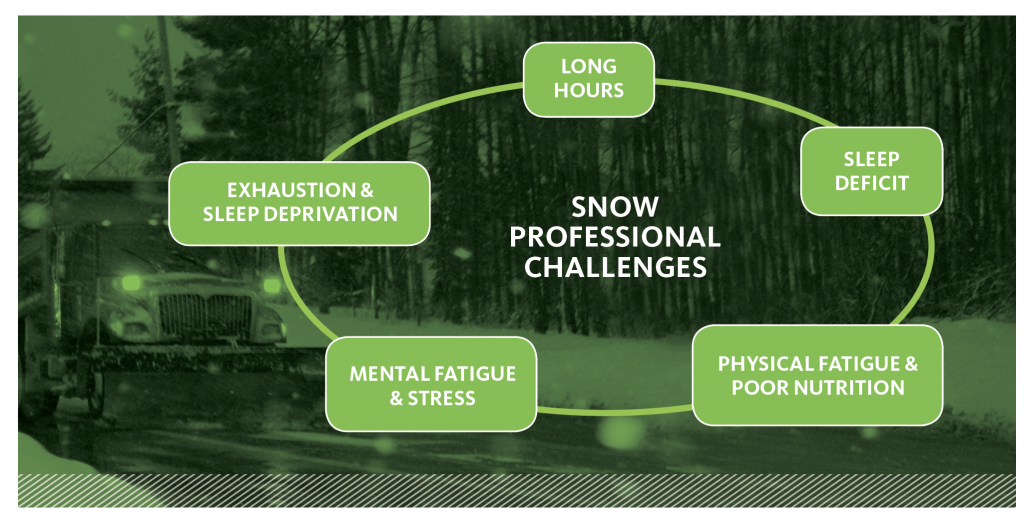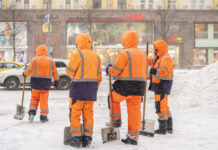Courtesy of the Snow & Ice Management Association (SIMA)
Winter can be vicious to snow and ice removal teams. Long hours, tough climate conditions and the perceived snow warrior mentality to power through can literally be a danger to your health.
It is tough to consider attention to health and wellness when snow is flying, customers are complaining and there is no end in sight. But if you don’t, your crews can get locked into a cycle of poor nutrition, sleep deprivation and fatigue — all of which have been scientifically proven to have negative physical and cognitive consequences. Not only are there physical ramifications, but damages and injuries related to fatigued driving and poor self-care can be costly.
Identify the major risks and seek better ways to mitigate them — break the cycle before it breaks you.
Nutrition and hydration
Stopping for meals may not be an option during a snowstorm, so many rely on fast food and energy drinks to keep going. Poor nutrition can lead to increased risk of heart disease, diabetes, obesity and other long-term health issues. Plan in advance some time for your team to stop for short breaks to refresh, grab a healthy snack and stretch.
Require your teams to drink plenty of fluids to help sustain energy and stave off fatigue. Mild dehydration can drain energy and fatigue you. Your body depends on water to flush toxins out of your vital organs, carry nutrients to your cells and provide a moist environment for ear, nose and throat issues. Hand labor crews are likely in need of more fluids than equipment operators given their increased level of activity.
Fatigue
Fatigue is a safety hazard, affecting the ability to think clearly, slowing reaction time, and decreasing attention, vigilance, short-term memory, judgment and other functions.
Given the uncertainty of and frequency of storms, it’s easy for snow fighters to get knocked off their natural body clock and start to accumulate sleep debt. Although sleep loss plays a primary role in fatigue, other contributing factors include stress, and the physical and monotonous demands of the tasks at hand (e.g., shoveling).
According to the National Safety Council, fatigue can affect an employee on multiple levels.
Cognitive performance declines, resulting in decreased vigilance, attention, memory and concentration — not good for a snow removal team member sitting behind the wheel of a piece of heavy equipment.
Microsleeps (nodding off, heavy eyelids, etc.) puts your team at serious risk to their personal safety, as well as that of the public your company has been hired to protect.
Combine those two and you could be headed for disaster.
As you plan your storm response, make sure you’re building in rest for your team (e.g., provide comfortable areas in your shop, schedule shifts that allow teams to go home or reserve hotel rooms closer to routes). Rest breaks — even 10- to 20-minute naps — have been shown to reduce fatigue and offer a reset to alertness.
Germs are sickening
During a storm, you may not have access to facilities to wash your hands. Prior to or after a storm event, when servicing trucks and equipment, use antibacterial wipes as a part of the cleaning process. Wipe down steering wheels, plow and equipment controls, door handles and all other items in the cab that crews may touch. Antibacterial wipes and lotion are inexpensive relative to the benefit and can be made readily available to your crews to encourage their use when soap and water are not available.
Maintaining safe working conditions is challenging when you consider the risks inherent with providing snow services. Our responsibility to the public begins with ensuring that we take care of ourselves first. The first rule any emergency responder learns is to not become a victim as well.
Learn more about how to implement health and wellness into your snow company culture. SIMA members can listen to the “For the Health of It” webinar that was featured during Snow Safety Week for free at www.sima.org/resources.
- Exhaustion & Sleep Deprivation
- Mental Fatigue & Stress
- Snow Professional Challenges
- Long Hours
- Physical fatigue & poor nutrition
- Sleep Deficit
Tear & Teach Pullout: Check out tips for healthy snacking in the field and how to avoid the dangers of fatigue and distracted driving in the field. All Tear & Teach resources can be downloaded at https://www.sima.org/snow-business/magazine-tear-teach.











![[VIDEO] Dickies®: Discover Workwear That’s Anything But Uniform](https://turfmagazine.com/wp-content/uploads/2023/06/1647663814-4b1a2a7742790a9b1e97a3b963477850192e1d6a9dfba9b07214a77bae25d6e3-d-218x150.jpg)































![[VIDEO] Dickies®: Discover Workwear That’s Anything But Uniform](https://turfmagazine.com/wp-content/uploads/2023/06/1647663814-4b1a2a7742790a9b1e97a3b963477850192e1d6a9dfba9b07214a77bae25d6e3-d-324x160.jpg)